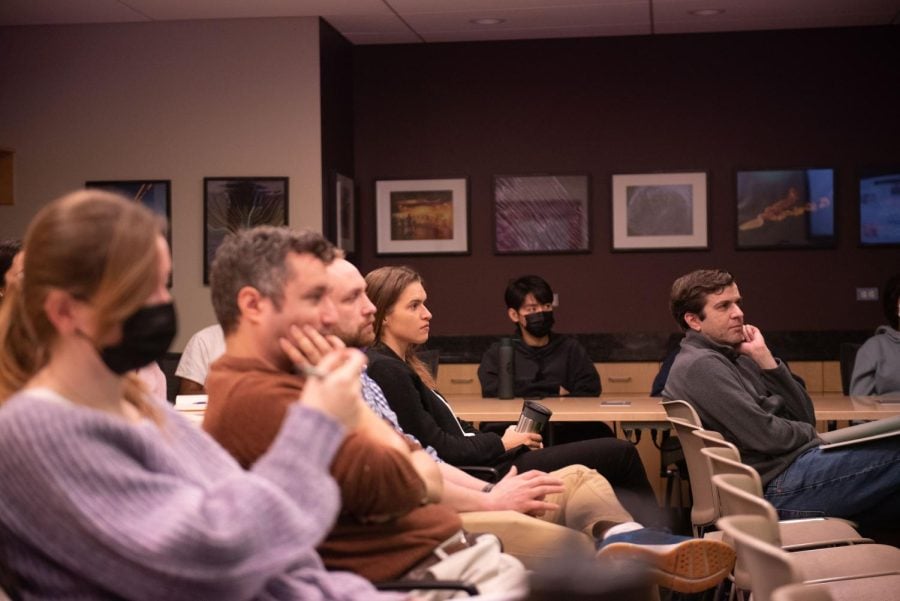University of Chicago Prof. Sarah Sebo presents robot-human interaction research
Erica Schmitt/Daily Senior Staffer
Around 40 attendees listened to University of Chicago professor Sarah Sebo present research on human-robot interactions at an event Friday.
January 8, 2023
Imagine a world where humans empathize with robots. Well, according to recent research at the University of Chicago, they already do.
About 40 students gathered in classroom B211 in the Technological Institute Friday afternoon to hear about University of Chicago computer science Prof. Sarah Sebo’s research as director of the Human-Robot Interaction Lab.
Sebo presented her talk “Social Robots that Shape Human-to-Human Interactions,” featuring two of her research projects that focus on better understanding human and robot interactions.
“I often find that human-robot interaction is really compelling because it tells us what are the building blocks of the human experience and what it takes to have a social interaction with another person,” Sebo said.
The first study focused on whether a robot’s vocalizations — whether “vulnerable,” “neutral” or “silent” — could shape trust among human teams of three in a competitive activity. Results showed that people were more social in team activities when the robot used vulnerable utterances after losing the game.
Sebo emphasized that robots can have an impact on a person’s emotional response to situations, similar to the Barsade’s Ripple Effect concept in which one person’s positive emotions affect a group of people.
“I think it’s just a really compelling idea that people don’t think about where they might put a robot in a workplace,” Sebo said. “It’s really important to introduce this idea that a robot might influence how people interact with one another, especially people that are going to be developing robots that are going to really impact our daily lives.”
The second study, conducted with University of Chicago second year computer science Ph.D. student Alex Wuqi Zhang, focused on whether a robot can better facilitate conversations between strangers compared to a poster or computer screen. Sebo and Zhang found that while the number of conversations did not differ between the groups, deeper questions were discussed in length by the robot group.
Some attendees expressed interest in the studies’ setups and asked questions, including fifth-year mechanical engineering Ph.D. student Milli Schlafly.
“It was exciting that Northwestern is starting conversations about work in different fields like this,” Schlafly said.
McCormick graduate student James Oubre said Sebo taught one of his classmates who recommended he attend the event.
Oubre said he enjoyed learning about a niche field in his area of study he was not familiar with.
“Especially in industrial settings, somewhere like Amazon where there’s a lot of human-robot interaction, it’s important to know how the robots can affect your workers not only (to) seek to be more productive but also to have happy workers,” Oubre said.
Sebo said she hopes to continue researching and presenting her work to increase interest in STEM and psychology fields.
“I’m really excited to see what the future of robotics will look like, where robots will be effective and what tools we’re going to need to develop and design in order to make their interactions with people helpful and inclusive,” Sebo said.
Email: [email protected]
Twitter: @eschmitt318
Related Stories:
— Jen Drummond presents research on microplastics’ impact on river ecosystems
— Psychology Prof. Onnie Rogers presents research on youth racial identity at IPR colloquium












